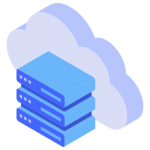What is Cloud?
"The cloud" refers to servers that are accessed over the Internet, and the software and databases that run on those servers. Cloud servers are located in data centers all over the world. By using cloud computing, users and companies don't have to manage physical servers themselves or run software applications on their own machines. Cloud computing is the on-demand availability of computer system resources, especially data storage (cloud storage) and computing power, without direct active management by the user. The term is generally used to describe data centers available to many users over the Internet. Large clouds, predominant today, often have functions distributed over multiple locations from central servers. If the connection to the user is relatively close, it may be designated an edge server.
Types of Cloud

Private Cloud
A Private Cloud is typically defined as everything behind a company's walls. These kinnds of systems operate in a company's local data centres, although some companies prefer to use colocated data centre facilities.

Public Cloud
The Public cloud includes a whole host of services and companies. The most common names are AWS, Microsoft Azure and Hapih Host Cloud. However, you may also hear software as a service such as MS OFFICE 365, Included

Hybrid Cloud
A Hybrid Cloud deployment most typically describes a company is operating both a Private Cloud and Public Cloud. In Hybrid Cloud environment, The private and public services are integrated with one another.

Multi Cloud
A multi-cloud strategy is an approach that operates any combination of Priavte, Public and Hybrid Clouds. An organisation may have multiple Public and Private Clouds or multiple hybrid clouds all either connected together or not.
What is Hybrid Cloud?
A Hybrid Cloud deployment most typically describes a company is operating both a Private Cloud and Public Cloud. In the Hybrid Cloud environment, private and public services are integrated with one another. Or in other terms, A hybrid cloud is a computing environment that combines a public cloud and a private cloud by allowing data and applications to be shared between them. When computing and processing demand fluctuates, hybrid cloud computing gives businesses the ability to seamlessly scale their on-premises infrastructure up to the public cloud to handle any overflow without giving third-party datacenters access to the entirety of their data.
Why Use a Hybrid Cloud?
Scalability
A Hybrid cloud provides easy and fast scalability of computing, storage, and other web-based resources. Servers can be deployed in minutes or hours, instead of days or weeks.
Lower Costs
Users save money, as they don’t have to pay for data center costs like hardware, software, and IT staff. They also benefit from economies of scale, as the data center costs are shared among all users.
Reliability
A Hybrid cloud provides easy and fast scalability of computing, storage and other web-based resources. Servers can be deployed in minutes or hours, instead of days or weeks.
Contact Form
For More Details or Queries, You can submit the form below
